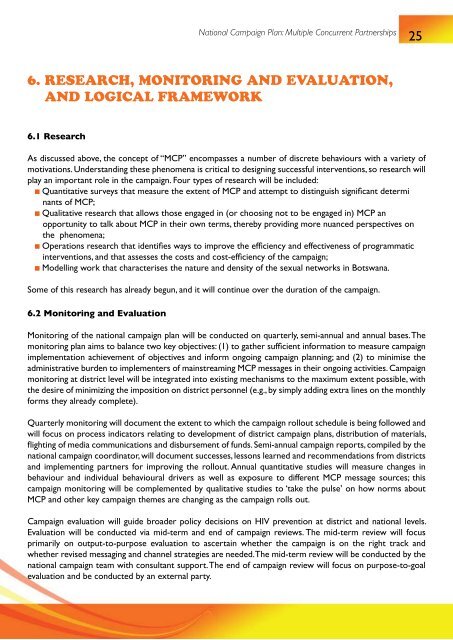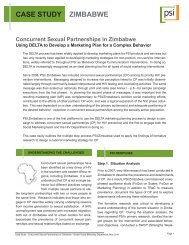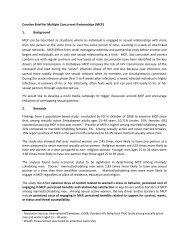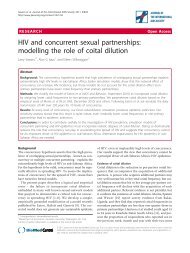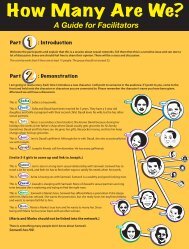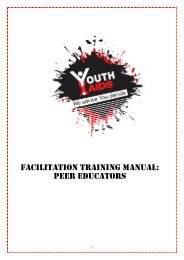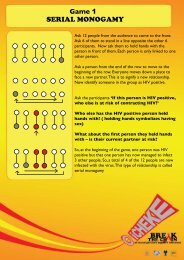O Icheke National Campaign Plan - CONCURRENT SEXUAL ...
O Icheke National Campaign Plan - CONCURRENT SEXUAL ...
O Icheke National Campaign Plan - CONCURRENT SEXUAL ...
- No tags were found...
You also want an ePaper? Increase the reach of your titles
YUMPU automatically turns print PDFs into web optimized ePapers that Google loves.
<strong>National</strong> <strong>Campaign</strong> <strong>Plan</strong>: Multiple Concurrent Partnerships256. RESEARCH, MONITORING AND EVALUATION,AND LOGICAL FRAMEWORK6.1 ResearchAs discussed above, the concept of “MCP” encompasses a number of discrete behaviours with a variety ofmotivations. Understanding these phenomena is critical to designing successful interventions, so research willplay an important role in the campaign. Four types of research will be included:Quantitative surveys that measure the extent of MCP and attempt to distinguish significant determinants of MCP;Qualitative research that allows those engaged in (or choosing not to be engaged in) MCP anopportunity to talk about MCP in their own terms, thereby providing more nuanced perspectives onthe phenomena;Operations research that identifies ways to improve the efficiency and effectiveness of programmaticinterventions, and that assesses the costs and cost-efficiency of the campaign;Modelling work that characterises the nature and density of the sexual networks in Botswana.Some of this research has already begun, and it will continue over the duration of the campaign.6.2 Monitoring and EvaluationMonitoring of the national campaign plan will be conducted on quarterly, semi-annual and annual bases. Themonitoring plan aims to balance two key objectives: (1) to gather sufficient information to measure campaignimplementation achievement of objectives and inform ongoing campaign planning; and (2) to minimise theadministrative burden to implementers of mainstreaming MCP messages in their ongoing activities. <strong>Campaign</strong>monitoring at district level will be integrated into existing mechanisms to the maximum extent possible, withthe desire of minimizing the imposition on district personnel (e.g., by simply adding extra lines on the monthlyforms they already complete).Quarterly monitoring will document the extent to which the campaign rollout schedule is being followed andwill focus on process indicators relating to development of district campaign plans, distribution of materials,flighting of media communications and disbursement of funds. Semi-annual campaign reports, compiled by thenational campaign coordinator, will document successes, lessons learned and recommendations from districtsand implementing partners for improving the rollout. Annual quantitative studies will measure changes inbehaviour and individual behavioural drivers as well as exposure to different MCP message sources; thiscampaign monitoring will be complemented by qualitative studies to ‘take the pulse’ on how norms aboutMCP and other key campaign themes are changing as the campaign rolls out.<strong>Campaign</strong> evaluation will guide broader policy decisions on HIV prevention at district and national levels.Evaluation will be conducted via mid-term and end of campaign reviews. The mid-term review will focusprimarily on output-to-purpose evaluation to ascertain whether the campaign is on the right track andwhether revised messaging and channel strategies are needed. The mid-term review will be conducted by thenational campaign team with consultant support. The end of campaign review will focus on purpose-to-goalevaluation and be conducted by an external party.


